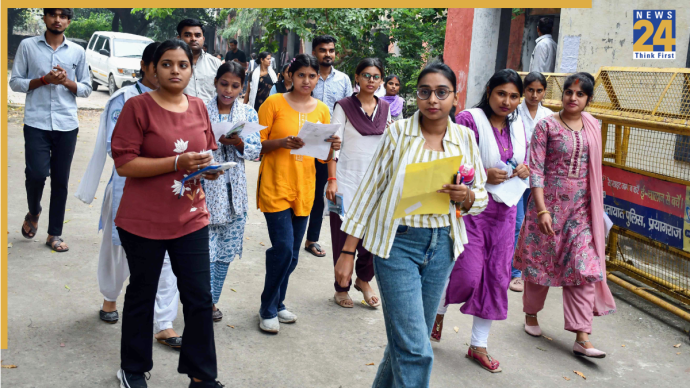The powerhouse of India, the youth, is distracted. Instead of working for 70 hours per week to build the nation, it is busy protesting against unemployment and swarming to be recruited as peons. This distraction should be the main reason behind Bharat not being the Vishvaguru yet.
While narrating his journey from socialist to ‘compassionate capitalist’, Infosys founder NR Narayana Murthy said, “Somehow our youth have the habit of taking not-so-desirable habits from the West and then not helping the country. Our youngsters must say: This is my country. I want to work 70 hours a week.”
If we break his magnificent formula into days, it becomes around 12 hours of work for 6 days and if you’re sincerely concerned ‘for the country’, you may also opt for a 10-hour work formula for seven days.
Going by the 6-day working formula: 12 hours for work, 6 hours for sleep, 2 hours for commuting, 2 hours for household chores like cleaning, laundry, and doing dishes, and the remaining 2 for daily routines like brushing and bathing. Oops! we missed cooking and eating. Of course, one may try doing photosynthesis for the sake of development.
Need to go to hospital? Meet friends? Get your laptop/mobile fixed? Have to buy groceries? Wait for Sunday. Forget about hangouts, celebrations, parties, get-togethers, and festivals. Everything can wait until we become productive enough.
Why be productive, in case you wish to know, the answer is growth. Growth for? Development. And development for? For a better life, peaceful life, healthy life. So, the ultimate goal is quality of life which doesn’t find any place in the parameters of Narayana Murthy. As per his principle, youth should dedicate themselves to work and focus the way Arjun had focused on the fish’s eye.
If we delve into his parameters, we find that this “compassionate capitalist” has forgotten to think about the basic growth of the young energetic generation for whom he has a 70-hour work plan. For a fresher, the joining package at Infosys used to range between Rs. 3.25 to 3.75 lakhs in 2011-12 and it is almost the same even today, after a decade. Not just diligence, Mr. Murthy is evidently consistent towards what he pays to boost the young power.
Narayan Murthy’s very own Infosys fired as many as 10,000 employees at the mid-senior level in the name of cost-cutting in November 2019. Notably, this was a pre-covid era when such mass firing was not so common. Also, if we go by the Q3 financial report of 2019-20 presented by the giant tech company, it says, “Revenues were ₹67,524 crore, growth of 10.4% YoY.” This ritual of firing kept occurring for consecutive years.
Here’s another data to illustrate the company’s love for employees and vice versa: 80,000 employees left Murthy’s Infosys in the last quarter of FY 2021-22. With this, it was the third consecutive quarter when more than 20% of its employees had bid adieu to this company. Reason – better package. Not only is Narayan Murthy unseeing the real productivity that’s peace and happiness but seems like he also puts a deaf year to paying his employees what his competitors pay. Atleast his FY reports say so.
Murthy’s giant company trimmed its employees variable to 60% this year and it was announced in the first quarter of 2023-24. When they couldn’t throw reasons like revenue loss, they coined another term, this time it was due to a “tough economic environment”. So, you do a tough job and get less paid for a tough economy from the organization that’s already paying less. For this quarter, their profit jumped to 11%, any benefits to employees? No!
But once you start working for Infosys, it’s difficult to go to its competitors. Not for its love for you but a cobweb that restricts former employees from working with competitors such as TCS, Wipro, IBM, Cognizant, and Accenture. This new rule erupted in 2022 after people started leaving for their growth.
Employees and employer, both want growth but their concept of growth is not aligned, for Murthy wants the growth of the nation that may happen only after the youth works for 70 hours maybe only at his organization.
If that wasn’t enough, Narayan Murthy, who dreams of better productivity in India and India as a developed economy, added a new clause to the rulebook of Infosys. Jill Prejan, the former Vice President of acquisition at Infosys, claims that she was instructed not to hire women who had children, 50-year-old applicants, or people of Indian origin.
So this is how India will grow in Murthy’s dictionary. Not only is his organization determined to sideline Indian employees who unfortunately have been known for cheap labour since the pre-industrialization era, but this ‘compassionate capitalist’ has also chosen to comb off women who manage work and home together. Hope Sudha Murthy extends some olive branches to all such women.
India, which is struggling with unemployment, where there are more colleges than railway stations and as many courses as mosquitoes has only slow claps to offer at Murthy’s statement. The young working class between the ages of 30 to 40 is seeing symptoms of heart disease and depression, what they badly need is a work-life balance to breathe and revive, to reset their priorities. What they have is a 70-hour work formula for ‘growth’ where everything will grow but them.












